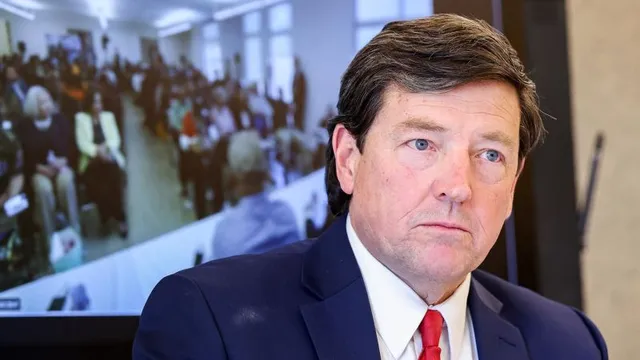
Senator Tillis rejects Trump's nominee for D.C. U.S. Attorney
2025-05-09 18:38- Senator Thom Tillis has declared he will not support Ed Martin's nomination due to Martin's defense of January 6 rioters.
- Tillis's stance is significant as he is a key member of the Senate Judiciary Committee that reviews such nominations.
- The opposition from Tillis and other Republicans raises doubts about Martin's confirmation before the impending deadline.
Express your sentiment!
Insights
In the United States, the nomination of Ed Martin as U.S. Attorney for the District of Columbia is under significant threat following strong opposition from key Republican Senator Thom Tillis. On May 6, 2025, Tillis publicly communicated to the White House that he would not support Martin's nomination due to concerns surrounding Martin's past involvement in representing criminal defendants connected to the January 6, 2021 Capitol riot. During their meeting, Tillis expressed that while Martin presented compelling arguments regarding some repentant rioters, he still firmly believes that anyone who breached the Capitol should face prosecution. Tillis's opposition is critical as he serves on the Senate Judiciary Committee which is responsible for reviewing nominations and sending them for a final vote in the Senate. Without Tillis’s backing, it is likely that Martin’s nomination will face insurmountable hurdles, especially since it was reported that several other Republican senators held similar concerns. Given the nature of these allegations and the ongoing scrutiny of the January 6 events, the nomination has drawn public outcry, presenting a severe challenge to the administration's efforts to have Martin confirmed. As the interim U.S. Attorney for D.C. since the beginning of the administration, Martin holds a key position but must be confirmed by May 20, 2025, to continue in this role. His connections to the Trump campaign and past comments about the January 6 rioters have made his confirmation contentious, generating a divide even among members of the Republican Party. Despite Donald Trump’s push for Martin's confirmation and assurances of his fit for the role, the ongoing fallout from Martin’s prior statements and actions remains a significant barrier. In light of this pushback, some former federal prosecutors have voiced their alarm over Martin’s limited courtroom experience and the controversies surrounding his leadership since his temporary start. This situation presents a challenging scenario for the Trump administration as they seek to maintain their agenda while dealing with the ramifications from Martin's nomination battle. Ultimately, with the current Senate sentiments, the odds of Ed Martin's nomination advancing appear increasingly slim, making it vital for the administration to explore alternative routes if they hope to retain Martin in any capacity post-May 20.
Contexts
The U.S. Attorney for the District of Columbia plays a crucial role in the federal judiciary system, primarily responsible for prosecuting federal crimes and representing the United States in civil litigation within the district. This position, often referred to as one of the most significant and influential U.S. Attorney positions in the country, encompasses a broad range of responsibilities that address both criminal and civil matters. The U.S. Attorney is tasked with ensuring the enforcement of federal laws, handling cases that may include drug trafficking, public corruption, gun offenses, and other serious crimes. The office's focus on combating violent crime and maintaining public safety is a core aspect of its mission, impacting the community and ensuring justice is served fairly and effectively. In addition to criminal prosecution, the U.S. Attorney is also responsible for civil litigation where the federal government is a party. This includes handling cases related to civil rights, immigration, labor disputes, and environmental laws, as well as representing U.S. agencies in legal claims brought against them. The office thus serves an important function in defending federal interests and upholding the rule of law, facilitating the resolution of cases in a manner that reinforces federal authority while respecting the rights of individuals. This civil work can often encompass high-profile and complex cases that require navigating intricate legal frameworks and balancing interests that may span both state and federal jurisdictions. Collaboration is another significant aspect of the U.S. Attorney’s responsibilities. The office works closely with various law enforcement agencies, including the FBI, DEA, and local police departments to investigate and prosecute criminal cases effectively. This partnership extends to other entities such as local and state prosecutors, sharing resources and expertise to enhance the effectiveness of justice initiatives. Additionally, the U.S. Attorney may engage in community outreach programs, aiming to educate the public on legal issues, promote crime prevention strategies, and foster positive relationships between law enforcement and the community. Overall, the responsibilities of the U.S. Attorney for D.C. highlight the integral role this position plays in safeguarding justice and enforcing federal laws in a diverse urban environment, which is not only the seat of the federal government but also a unique microcosm of the nation's broader challenges and aspirations. As the top federal prosecutor in the district, the U.S. Attorney's decisions and actions have far-reaching implications, each case contributing to the tapestry of law and order within the country, reflecting the values of justice, equity, and diligence in public service.